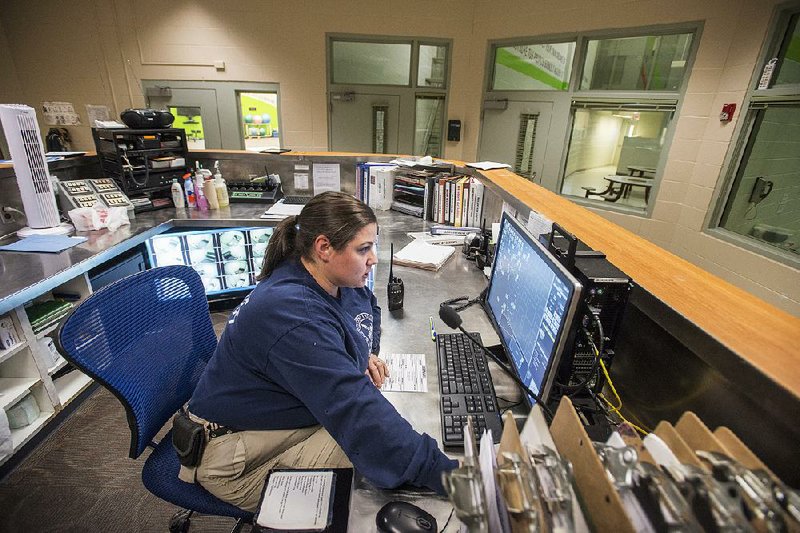FAYETTEVILLE — The 15-year-old girl shuffles into the courtroom, eyes downcast. Thin with long, wavy hair, she rubs her hands nervously.
RELATED ARTICLE
http://www.arkansas…">Locking up unruly youths in state depends on judge
Chad Day reported these stories for the Arkansas Democrat-Gazette with the support of the Fund for Journalism on Child Well-Being and the National Health Journalism Fellowship, programs of the Center for Health Journalism at the University of Southern California's Annenberg School of Journalism.
The programs provided training and funding for Day.
The Democrat-Gazette maintained full editorial control over the content of these stories.
To report these stories, Day relied on more than 30 interviews with juvenile court judges, state Youth Services Division officials, public defenders, child advocates, policy analysts, researchers, youth service providers, juvenile probation officers, sheriff’s deputies, families involved in the juvenile justice system and children detained in juvenile detention centers.
Day reviewed several sets of data from the state Division of Youth Services, the Administrative Office of the Courts, the Arkansas Department of Education, the federal Office of Juvenile Justice and Delinquency Prevention, and various juvenile courts and lockups around the state.
Day also observed Family in Need of Services proceedings in juvenile court and reviewed thousands of pages of court documents, youth treatment files, statistical reports and academic studies.
She’s been running away from home, out at all hours and in situations unsafe for any child. Her mother says she’s tried everything. Her mother’s at a loss.
Enter Judge Stacey Zimmerman and the juvenile court of Washington County. The judge’s penetrating gaze flashes to the girl. Her brow furrows.
Testimony begins, and the real work starts.
Every year, thousands of boys and girls like this teenager appear before Arkansas judges.
They’re not hardened criminals charged with violent crimes. Known as status offenders by the courts, these youths broke laws that apply only to children.
The courts are expected to treat them differently from children who commit adult crimes.
Yet each year, hundreds of these truants, runaways and the hard-to-control end up in the same juvenile-offender lockups as youths who have raped, robbed or murdered, an Arkansas Democrat-Gazette investigation has found.
Most of them are teenagers, but some have been as young as 8 or 9, booking records show.
Despite research indicating that jailing status offenders does more harm than good, a number of Arkansas judges continue to funnel them into juvenile detention centers, where they can stay for a few days or as long as three months.
Last year, for example, 11th-West Judicial Circuit Judge Earnest Brown detained status offenders nearly 200 times.
Brown, who presides in Jefferson and Lincoln counties, and other judges say detention is an inherent judicial power.
The threat of lockup for violating a judge’s orders holds adults and children accountable. It teaches them to respect the law, Brown said.
“If you put a court order in place and your court order has no teeth to it, then you spin your wheels,” Brown said.
Time in lockup has given many youths a needed wakeup call, he said.
But child advocates, some Arkansas juvenile court judges and others who study children’s health say that jailing status offenders puts them at risk of harm and psychological trauma.
Lockup also makes status offenders more vulnerable to learning habits that can lead to lives of crime, they say.
“We’re talking about kids who haven’t committed a criminal offense. These are kids who just make us mad,” said Steve Teske, the chief juvenile court judge in Clayton County, Ga. He has handled thousands of status offender cases over his career.
Teske advocated for years for states to stop locking up status offenders.
Over the summer, he visited Arkansas and urged lawmakers to ban the practice.
“They’re not the kids who scare us,” Teske said during an interview. “But if we overuse detention with them, what’s going to happen is we’re going to take the kids who make us mad and turn them into the kids who scare us.”
‘VIRTUALLY IMPOSSIBLE’
For a brief period, with passage of the 1974 Juvenile Justice and Delinquency Prevention Act, federal law demanded that states stop locking up status offenders if those states wanted to receive federal funding.
But six years later, in 1980, Congress amended the law to allow for an exception.
The change, known as the valid court order exception, allowed judges to lock up youths who violated court orders. Since then, children across the country have been jailed for disobeying judges’ orders — some as simple as “go to school” or “obey your mother.”
In Arkansas, these youths don’t go into the custody of the state Division of Youth Services. Instead, they end up in one of 14 county-operated juvenile detention centers sprinkled around the state.
Last year alone, status offenders entered youth lockups more than 500 times, according to booking sheets and interviews with juvenile court judges.
(The state Division of Youth Services put the number of status offender detentions at more than 1,000 last year, but problems with the division’s data pointed out by juvenile court judges indicate that the number is closer to 500.)
Federal law requires that status offenders be segregated from delinquent youths, but the methods used have fallen short of the goal, several Arkansas juvenile justice experts say.
Some county juvenile lockups vary the times when children are released from their cells. Others house status offenders in separate cellblocks.
Curtains and rolling blackboards in classrooms keep delinquents and status offenders apart.
But these techniques do little to shield status offenders from the ill effects of detention, say guards and lockup administrators interviewed by the Democrat-Gazette.
“By law we have to separate sight and sound, and that’s virtually impossible,” said Jean E. Mack, director of the Washington County Juvenile Detention Center in Fayetteville.
Mack said she has installed blinds and other barriers in her facility to keep status offenders from being exposed to delinquent youths, methods she says meet federal and state standards.
None of these methods mitigate the harm that comes from putting a developing child in a locked cell, she said.
“They still are forming their brains and their ways of thinking, and [when] you introduce them to this sort of thing early on, we’re making our future criminals. No matter how great the facility,” she added.
Youth Services Division Director Marcus Devine said this is true across the state.
“These kids are around each other, can see each other, can hear each other, especially in classrooms,” Devine said. “What we want to do is not have kids that don’t need to be in that scenario, in that scenario.”
‘RED CARPET TO PRISON’
In the Jefferson County Juvenile Detention Center, for example, a 10-year-old girl was detained for status offenses for a week during the summer of 2014.
While there, the facility housed much older children charged with sexual offenses, burglary, second-degree battery and felony aggravated assault, according to booking records obtained from the state under the Arkansas Freedom of Information Act.
At the White River Juvenile Detention Center in Batesville, a 12-year-old boy spent a month in detention for a status offense. He, too, was around older boys charged with rape, first-degree battery and other felonies, booking records show.
The White River lockup’s records show another troubling situation: booking sheets for at least four children under the age of 10.
These children were too young to be charged with delinquent offenses. State law limits delinquency charges to those 10 or older.
But status offense cases, known in court as Family in Need of Services (FINS) proceedings, can be filed for children of any age.
An 87-pound, 9-year-old boy spent a week in a cell at the White River lockup in October 2013. The reason he was detained?
“Juvenile in need of support,” according to his booking sheet.
A year before, the same boy had been held for a few days for contempt of court, booking sheets show.
The boy’s detention appalls public defender Dorcy Corbin, who has represented children charged with crimes for more than a decade.
Status offenders like the 9-year-old are being put on “the red carpet road to prison,” Corbin said.
“The more you make kids feel like prisoners and that they can live in prison, the more likely that’s where they’re going to end up,” said Corbin, who now works as a public defender in Pulaski County.
It’s a pattern she’s seen over and over for years, she said.
Jerry Walsh sees the same pattern when boys and girls wind up in one of the centers operated by South Arkansas Youth Services.
The nonprofit runs various programs for at-risk youths. It also operates five residential facilities for delinquent youths who have been committed to the Arkansas Division of Youth Services, what many refer to as the “deep end” of the juvenile justice system.
“We do see a lot of kids crossing over to the criminal justice system, and it started out with kids violating court orders related to school,” Walsh said.
‘NOT RIGHT VEHICLE’
Child advocate Paul Kelly opposes jailing any status offenders because it “sets into motion punitive reactions to cries for help.”
A senior policy analyst at Arkansas Advocates for Children and Families, Kelly has spent much of the past three decades trying to keep children who don’t belong in lockups out of them.
Skipping school or running away is often a symptom of a larger problem, a sign that a child is struggling with early childhood trauma or domestic problems at home, he said.
“They are acting out in response to trauma and other sorts of things in their lives, and then are punished for it. What does that say to them about the support that the community and the adults in their lives are providing them?” Kelly said.
Kelly’s argument rests on academic studies of the negative consequences of placing children in secure confinement.
A 2000 study published in Pediatrics, the journal of the American Academy of Pediatrics, found that incarcerated boys had “significantly poorer” health than boys who attended school.
Other research, including studies in Oregon and California, has found that placing youths in detention facilities can exacerbate behavioral and mental health problems. The experience can retraumatize children who have suffered abuse and neglect.
It also can be counterproductive.
A 1999 study of youths in the Arkansas Division of Youth Services published in the Journal of Criminal Justice found that by itself, jailing children increased the likelihood that those youths would commit additional crimes.
Detention was even more of an indicator of future criminality than gang activity or whether the youths had carried weapons, according to the study.
Jason Szanyi, the director of institutional reform at the Center for Children’s Law and Policy, said judges should work to keep status offenders out of lockup by trying to identify and treat the root of their behavioral problems.
“It’s not that there should be no response to those kids,” said Szanyi, who has been consulting with Benton and Washington counties as part of the Annie E. Casey Foundation’s Juvenile Detention Alternatives Initiative. The foundation funds government and private programs to “create more innovative, cost-effective responses to the issues that negatively affect children.”
The detention alternatives initiative wants judges to detain youths in delinquency proceedings only if they pose risks of committing serious offenses or pose risks of not appearing for court.
The program opposes detaining status offenders under any circumstances.
“If his or her family is struggling, we want to figure out what the underlying issue is and try to address that. It’s just that detention isn’t the right vehicle for meeting those needs or addressing those issues,” he said.
Arguments like Szanyi’s have gained national attention over the past several years.
In 2010, the National Council of Juvenile and Family Court Judges passed a resolution opposing the valid court order exception, saying it should be eliminated.
Last April, U.S. Sen. Chuck Grassley, R-Iowa, introduced the Juvenile Justice and Delinquency Prevention Reauthorization Act of 2015. The legislation would require states to stop detaining status offenders in lockups within three years if the states want to continue to receive federal funding.
The bill aims to get states like Arkansas in line with the 16 states that ban the detention of status offenders, as well as a handful of other states where judges have the option but don’t use it.
‘NOT EASIEST CALL’
In Arkansas, some judges have already phased out detaining status offenders.
Sixth Circuit Judge Wiley Branton, who presides in Pulaski and Perry counties, hasn’t locked up a status offender for at least five years.
“I’ve gotten over myself as a judge, which is a hard thing to do sometimes. So I can now accept the fact that a kid might willfully disobey my order, and it won’t necessarily get me bent out of shape,” Branton said.
“If it’s a purely FINS kid, I’m not going to open up my detention facility,” he added.
Not all Arkansas judges think this is a good idea.
Retired 12th Judicial Circuit Judge Mark Hewett was one of the state’s first juvenile court judges. Over nearly three decades on the bench, Hewett used his contempt power to detain hundreds of children for not following his orders to attend school.
In 2014, Hewett’s last year on the bench, status offenders were detained 73 times on his orders.
For Hewett, detention was part of holding youths accountable and making sure they respected his orders.
Children who appeared before him in Family in Need of Services cases were usually given several chances to stop skipping school, Hewett said.
But many would refuse to attend, he said.
“Eventually you get to the point where, some of them, they’re just not going to comply with what you’ve asked, and that point is when you start placing them in the juvenile detention center,” he said.
For many of the youths, particularly those 16 or 17 years old, this often meant a 90-day sentence in the Sebastian County Juvenile Detention Center with one caveat — children who got a GED could go home early.
More than 650 youths, including status offenders and delinquents, have obtained their General Educational Development diplomas that way since Hewett started the program in 1996, he said.
He’s reminded of it often when he’s in Fort Smith.
“I’ve had some come up to me when I’ve been out to eat with my wife and friends. I’ve had a waitress come over to me and say, ‘I’m so glad you were tough on me because it turned my life around,’” Hewett said. “I’ve had that happen several times.”
Arkansas Supreme Court Justice Rhonda Wood said she’s not convinced that banning detention for status offenders is a good idea.
Wood spent a lot of time handling status offender cases as a juvenile court judge in Faulkner, Van Buren and Searcy counties from 2007-12.
Detention should be used sparingly in status offender cases, but judges should have it as an option, Wood said in an interview.
Wood thinks it’s likely that Arkansas judges will continue to detain status offenders even if Congress passes legislation and withholds federal dollars. She also doesn’t think the Arkansas General Assembly can take away judges’ authority to enforce their contempt orders with detention.
“I think you’re going to have juvenile judges say, ‘I have that power. It’s not up to me to make sure federal funding is there. It’s up to me to make the best decision for a juvenile,’” she said. “I used [detention for status offenders], I’ll be frank with you, when I was on the juvenile bench. It’s not the easiest call.”
‘LIKE ONIONS’
In 17 years as a juvenile court judge in Washington and Madison counties, Stacey Zimmerman has seen children who have committed the worst kind of crimes.
But she’s also seen hundreds of children like the 15-year-old girl before her one day this fall.
On this day, Zimmerman deals only with Family in Need of Services proceedings. She starts early and leaves late.
The day is packed with family after family, and none of the cases are simple.
As Zimmerman and her court staff try to find the source of a child’s problem, they unearth a variety of social ills: extreme poverty, substance abuse, alcoholism, domestic violence and parents in prison. They’ve seen what can happen when children grow up in these environments.
In one case, members of a family file in. They attracted the court’s attention after the children missed weeks of school. One child, a kindergartner, missed 46 days.
In case after case, Zimmerman talks with parents and children about services available to them. A diaper assistance program. Numerous counseling services. A class that teaches families how to resolve conflicts and develop closer connections.
The class provides dinner, too, Zimmerman notes.
But Zimmerman’s assistance comes with a caveat: Each family must abide by her orders.
For most of her time on the bench, Zimmerman hasn’t hesitated to lock up status offenders if they disobeyed her orders to attend school, obey their parents or abide by curfews.
But lately, Zimmerman’s detention of status offenders has dropped drastically, from 51 in 2014 to just six through the first half of this year.
“We’re trying to do it a little differently, coming up with more programs and alternatives to prevent me from having to lock up kids,” Zimmerman said.
Rather than lockup, Zimmerman will order art classes, fishing, hiking and martial arts, in addition to counseling and psychological services.
She also employs some other unconventional approaches.
Out-of-control child? Zimmerman orders time cleaning out cages at the animal shelter.
Chronically truant child? Zimmerman sends parents to spend the day at school with their truant children. The more embarrassing the better, she said.
“I’ll say, ‘Mom, bring your Hello Kitty lunchbox with you,’” Zimmerman said.
The goal is to redirect the child’s behavior without resorting to lockup, she said.
The target type of child? The 15-year-old girl. She’s the sort of child who easily could have ended up in lockup.
The judge takes a hard look at the girl. It’s clear Zimmerman’s unhappy with the girl’s behavior.
She shouldn’t be running away from home. She shouldn’t be skipping school. The behavior reeks of defiance of authority, something no judge likes.
But as the girl’s mother testifies, the rest of the story starts coming out, and what appeared to be an unruly youth skipping school and running away, turns into something else entirely.
Domestic violence. Substance and alcohol abuse. And an unsettled home life that reveals classic signs of childhood trauma.
What appeared to be a defiant teenager transforms into a child looking for someone’s help.
Zimmerman’s focus also transforms. She shifts from punishing the girl to protecting her. She takes the girl into the custody of the Arkansas Department of Human Services until she can find a safe place for her to live.
After court, Zimmerman holds up the girl’s case as an example of why detaining a teen isn’t always the answer. Time in a jail cell wouldn’t have helped with the underlying problems going on in that girl’s life, the judge said.
“So many of these FINS cases are like onions,” Zimmerman said. “There are so many things going on that locking up a kid is not going to solve.”







